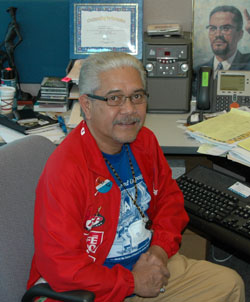By Libby Schultz

Addi Batica, contract compliance specialist. Photo by Nick Carpenter |
“It’s complicated,” Addi Batica said about his job as a contract compliance specialist for MnDOT.
Adelberto “Addi” Batica has worked in the Office of Civil Rights as a contract compliance specialist for 19 years. Prior to working for MnDOT, he was an enforcement officer at the Minnesota Department of Human Rights for nearly three years.
Newsline recently sat down with Batica to find out more about his role with the department.
What is a contract compliance specialist?
A contract compliance specialist is someone who makes sure contractors are meeting their goals to employ women and minorities, and have adequate on-the-job training participation. More specifically, I work closely on employment issues as they relate to civil rights, ensuring that contractors implement employment and workplace practices that are fair and free from all forms of discrimination. I spend time out of the office interviewing workers and on-the-job trainees on site to make sure they are making progress. I also attend to any civil rights issues and concerns they might have.
Where do you spend most of your time?
I spend most of my time in District 1 and District 2. The population of minorities is different in northern Minnesota compared to the Twin Cities Metro. I work more with the Native American communities there.
MnDOT funds programs to prepare minorities for working in construction with MnDOT. For example, there was a program last spring on the Fond du Lac reservation that focused on getting applicants their commercial vehicle driver’s licenses.
What is a challenge you face in your job?
A specific challenge this year was the shutdown. All of the graduates from the Fond du Lac reservation, except one, were offered a job in construction with MnDOT—then they were laid off a month into their job. It was sad to see a group of hardworking students experience that early on in their careers.
How does your job impact the process at MnDOT?
If my job did not exist, the awarding of major projects would come to a total stop. Also, MnDOT’s share of federal dollars depends on how well it follows civil rights standards and programs mandated by the Federal Highway Administration.
What is a “major project" ?
A major project is one that is estimated to cost $5 million or more. In that case, a workforce compliance plan is sent to me, outlining the contractor’s plan to provide opportunities to women and minorities. Each project needs a clean bill of health from civil rights.
What would you like people to know about your job?
That it is complicated. I have to build relationships with workers on site and deal with their issues in the workplace. Additionally, I have to build relationships with MnDOT, county and city engineering and field staff, contractors, unions, community-based organizations and tribal governments. But, I love that kind of work.
Do you or a co-worker have an interesting job to share with readers? Click here to send us your ideas, and we’ll contact you for more information.
Recent employee profiles:
|



